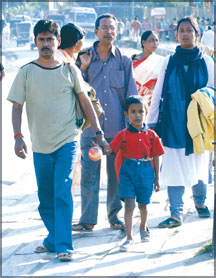|
DAILY NEWS ONLINE |
|
|
|
OTHER EDITIONS |
|
|
|
|
|
|
|
|
|
OTHER LINKS |
|
|
|
|
|
|
 |
Kashmir sees a chance for peaceSRINAGAR, India(AFP) - The garden bar is full and the chatter grows louder as far down the hill the waters of Kashmir's fabled Dal Lake shimmer under the setting sun.
Indian tourists are returning in large numbers to this verdant Himalayan valley this summer as their government gropes forward in a stuttering peace process with Pakistan. The tide of separatist violence is ebbing and the army has promised to extend a "velvet glove" to long-suffering civilians. Sitting under the broad boughs of a centuries-old chinar maple tree, it is easy to forget that Sunday marks 16 years since the bloody rebellion broke out against Indian rule of Kashmir. The watering hole at one of Srinagar's top hotels - the former maharaja's residence - boasts one of the best views over the lake at dusk, shadowed by high forested ridges. For a reality check, the authorities count 44,000 people dead since 1989 - separatists put the toll twice as high. But Kashmir state tourism minister Ghulam Hassan Mir told AFP more than 350,000 tourists had already visited Kashmir by mid-July this year. And he expected that by the end of the month, arrivals would surpass the 375,000 who came for the whole of 2004. Foreigners however remain few. In 1989, tourists numbered 722,000. Only 6,000 visited the following year as blood flowed, and just 27,000 in 2002. The minister predicted one million arrivals in 2006. "Kashmir is as safe as any part of the world for tourists," he says, blaming the media for exaggerating the risks. "There are many reasons militants would not attack tourists," Mir assures, citing the guarantee of worldwide condemnation and loss of support from a population which desperately needs tourist income after so many bleak years. Leading moderate separatist Mirwaiz Umar Farooq barely shares the minister's optimism, but he does believe that "a window of opportunity" is open today for a negotiated settlement on Kashmir. "The government of India has to realise ... this is an opportunity. They have to take the opportunity," he told AFP. Lieutenant General S.S. Dhillon, the army commander in the Kashmir valley, agreed that a window is open for a political solution. "All our actions are centred around this aspect (a political settlement), of improving the situation, containing the situation in a manner to permit normal functioning of government and movement forward," he said in an interview. "Keeping in view the present situation ... and the moves between the two countries, this definitely should be a time for taking the peace process forward." However he cautioned that while violence levels have recently fallen 25-30 percent: "The terrorists still retain the potential and the ability for high profile, sensational strikes... and the potential to vitiate the general atmosphere." Farooq, chairman of the All Parties Hurriyat (Freedom) Conference - the main separatist grouping - also warned that the window of opportunity could quickly close if incidents such as the killing by soldiers of three teenagers on July 24 are repeated, or if President Pervez Musharraf loses power in Pakistan. The army apologised profusely for the boys' deaths, but tension ran high and violent protests followed. "Within the next year or so, two years, if we don't have any movement forward (in the peace process) it's very difficult to predict what kind of a situation we are going to be (in)" in Kashmir. "After that, will we have a lot of militancy, have extremists forces again taking over?" he asked. India's junior Home Minister Sriprakash Jaiswal last week said that New Delhi would arrange for talks with moderate Hurriyat leaders "soon". But he gave no date and mistrust of New Delhi remains very high in Kashmir where Musharraf is seen as the main driving force for a solution. To underline the warnings, hardline separatist politicians, who have the backing of the armed rebels, brand talks with New Delhi "meaningless". They want tripartite talks involving India, Pakistan and the "true representatives" of Kashmiris, that is to say those advocating violence - something Delhi has refused to countenance. For Syed Ali Geelani, who heads the hardline Movement for Freedom (Tehreek-e-Hurriyat), the issues remain simple: India must grant Kashmiris a free vote on their future. |
|
|
|

